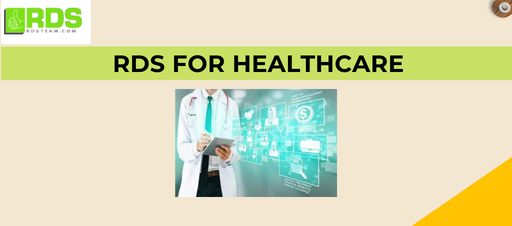Exploring the Benefits of RDS for Healthcare Providers

As healthcare providers continue to rely on technology to manage patient data and deliver care, it is becoming increasingly important to ensure that sensitive information is secure and easily accessible. RDS for healthcare offer a solution to these challenges, providing healthcare providers with secure, remote access to patient information and other critical resources. In this article, we will explore the benefits of rds for healthcare providers.
Introduction to RDS
Remote Desktop Services allow users to access a remote desktop environment from any device, including laptops, tablets, and smartphones. This environment includes access to applications, data, and other resources that are stored on a remote server, rather than on the user’s local device. By accessing these resources through RDS, users can work securely and efficiently from anywhere, without the need for expensive hardware or complicated software installations.
Increased Security and Compliance
One of the primary benefits of RDS for healthcare providers is increased security and compliance. By storing patient information and other critical data on remote servers, rather than on individual devices, healthcare providers can better protect sensitive information from unauthorized access or data breaches. Additionally, RDS allows providers to ensure compliance with HIPAA and other regulatory requirements, by implementing strict access controls and data encryption.
Improved Access to Patient Information
Another key benefit of RDS for healthcare providers is improved access to patient information. By providing remote access to electronic health records (EHRs) and other clinical applications, healthcare providers can ensure that patient information is readily available to authorized users, regardless of their location. This can help to improve patient care and outcomes, by allowing providers to quickly access and update patient information as needed.
Streamlined Workflows and Productivity
RDS can also help to streamline workflows and increase productivity for healthcare providers. By allowing users to access the same applications and resources from any device, RDS can help to eliminate the need for multiple logins or complex IT configurations. Additionally, RDS can help to reduce the time and costs associated with software updates and maintenance, by centralizing these processes on remote servers.
Reduced IT Overhead and Maintenance
Another benefit of RDS for healthcare providers is reduced IT overhead and maintenance. By outsourcing IT infrastructure and support to remote servers, healthcare providers can reduce the need for on-site hardware and personnel. This can help to reduce costs and increase efficiency, by allowing IT staff to focus on more strategic initiatives, rather than routine maintenance and troubleshooting.
Enhanced Collaboration and Communication
Finally, RDS can help to enhance collaboration and communication among healthcare providers. By providing remote access to messaging, video conferencing, and other collaboration tools, copy machine service near me, canon large format printer, canon printer wide format, RDS can help to facilitate communication and teamwork, regardless of the physical location of users. This can be particularly beneficial for healthcare providers who work in distributed or remote settings, such as telemedicine or home healthcare.
Security Considerations One of the most important considerations for healthcare providers is security. Both RDS and VPN offer secure access to remote resources, but there are some key differences. RDS provides users with a secure, isolated environment that is separate from their local device. VPN, on the other hand, connects the user’s local device directly to the remote network, which can increase the risk of security breaches or malware infections. Access and Mobility Another consideration is access and mobility. RDS provides users with access to a remote desktop environment from any device, including laptops, tablets, and smartphones.
VPN, on the other hand, typically requires users to install a VPN client on each device they want to use to access remote resources. This can be a barrier for users who need to access resources from multiple devices. Scalability and Flexibility Scalability and flexibility are also important considerations for healthcare providers. RDS offers cloud-based solutions that can be easily scaled up or down as needed, without the need for large upfront investments in hardware or software. VPN, on the other hand, requires healthcare providers to invest in and maintain their own VPN infrastructure, which can be costly and time-consuming. Maintenance and IT Overhead Maintenance and IT overhead are also important considerations. RDS allows healthcare providers to outsource IT infrastructure and support to remote servers, reducing the need for on-site hardware and personnel. VPN, on the other hand, requires healthcare providers to manage and maintain their own VPN infrastructure.
which can be time-consuming and costly. Cost Considerations Finally, cost is an important consideration for healthcare providers. RDS offers cloud-based solutions that can be more cost-effective than VPN, particularly for smaller organizations that do not have the resources to invest in their own VPN infrastructure. However, for larger organizations with existing VPN infrastructure, VPN may be a more cost-effective solution.
Conclusion
Remote Desktop Services offer a range of benefits for healthcare providers, including increased security and compliance, improved access to patient information, streamlined workflows and productivity, reduced IT overhead and maintenance, and enhanced collaboration and communication. By adopting RDS, healthcare providers can improve patient care and outcomes, while reducing costs and improving efficiency.
RDS and VPN are both viable solutions for healthcare providers looking to provide secure remote access to patient information and other critical resources. Ultimately, the decision between RDS and VPN will depend on a number of factors, including security considerations, access and mobility, scalability and flexibility, maintenance and IT overhead, and cost. Healthcare providers should carefully evaluate these factors when deciding which solution is best for their needs.